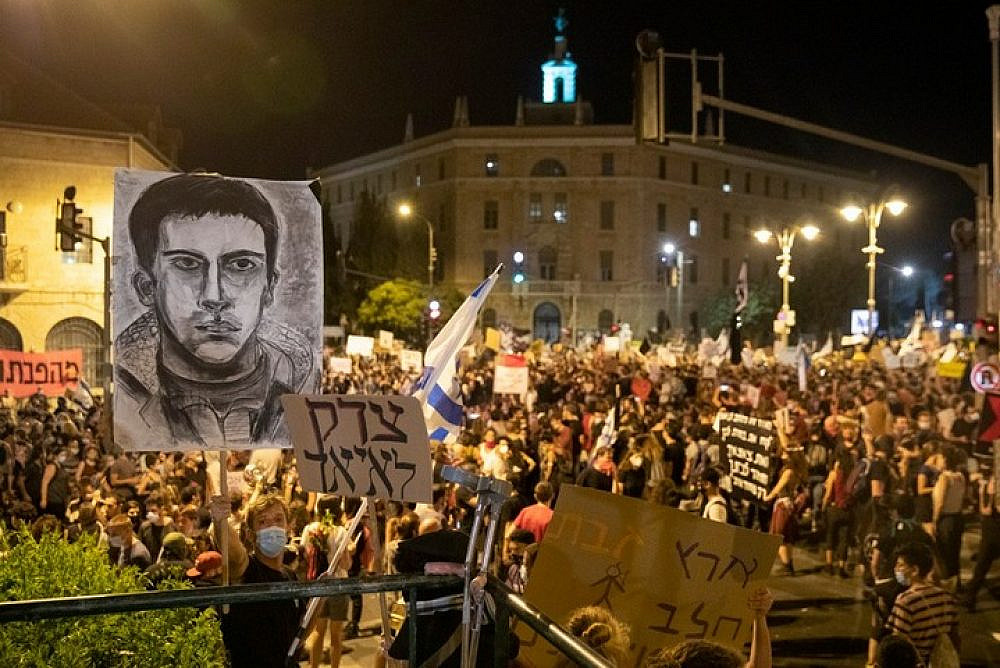The growing presence of Israeli anti-occupation protesters has been one of the most notable aspects of the wave of demonstrations that started on July 14 outside the Prime Minister’s Residence on Balfour Street, Jerusalem. Among other things, this bloc of protesters have demanded justice for Iyad al-Hallaq, a Palestinian with autism whom Israeli police shot dead in the Old City of Jerusalem in late May.
The anti-occupation bloc, comprising several hundred protesters, are not on the margins of the demonstrations. Last Saturday night, for example, it was possible to hear them chanting “Justice for Iyad” at the Prime Minister’s residence, even as Israeli riot police were forcefully dispersing the crowd.
In contrast to countless instances over the past decade, in which left-wing protesters have tried to insert radical messaging into mainstream demonstrations and been met with rejection or violence, this time, the response was very different.
The current protests did not start out this way. Back in May, a few dozen radical leftists tried to join in one of the “Black Flag” protests against Netanyahu’s anti-democratic maneuvers. The left-wingers brought banners reading “Israel is not a democracy — Apartheid;” the other protesters, mostly older participants, asked the police to push the group back to the edges of the demonstration.
‘No longer seen as an outcast’
Dozens of anti-occupation activists taking part in recent demonstrations say the picture has greatly changed. Everyone that +972 spoke with said there have hardly been any hostile reactions to their presence, and certainly no attempts to ostracize or censor them.
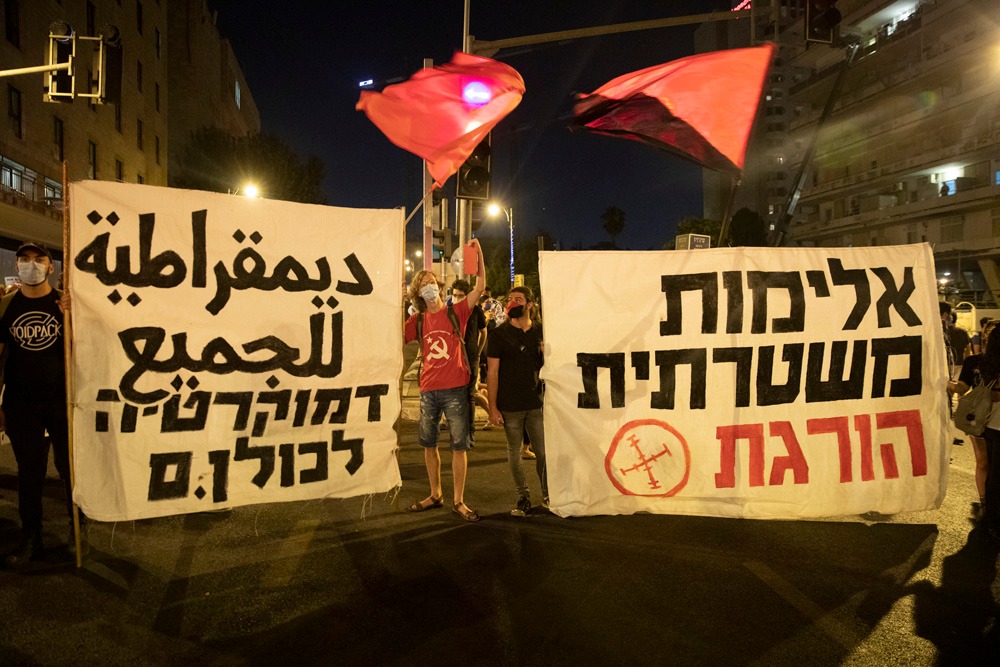
Some say this is because the protests are decentralized; others say it is because the radical leftists are there in solidarity with the protests, and are not trying to overshadow them. Still others claim that government incitement has turned everyone in the demonstrations into “leftists,” thereby legitimizing the word.
What is more, the anti-occupation bloc has gradually become more integrated into the main demonstration. While at the start they stood separately, at Thursday’s and Saturday’s protests, different anti-occupation groups were dispersed throughout the crowd.
“People are simply joining in, and the messaging of the protests no longer scares them if they don’t agree with them,” says Sahar Vardi, a Jerusalem-based activist who was arrested in the first week that she took part in the protests. “Someone with a sign reading ‘Not right or left’ joined our group and chanted ‘Justice for Iyad,’ then continued on.”.
Vardi, like others whom +972 spoke with, believes the decentralized nature of the demonstrations has opened up a space for anti-occupation messaging within the broader movement. “Everyone is bringing their own message,” she explains. “People are coming out to protest because they’re desperate, but some of them agree with us. Anyone standing next to a leftist shouting about the occupation is no longer seen as an outcast.”
“There’s no unifying factor other than wanting to topple Bibi,” says activist Uri Givati. “Everyone will give a different reason as to why they’re coming [to protest]. So people can’t say, ‘anti-occupation protests — no; my protest — yes.’
“I haven’t encountered any attempts to silence us,” Givati adds. “It’s because people are having financial difficulties, and are saying to themselves: ‘Anyone who can stand with us should join in.'”
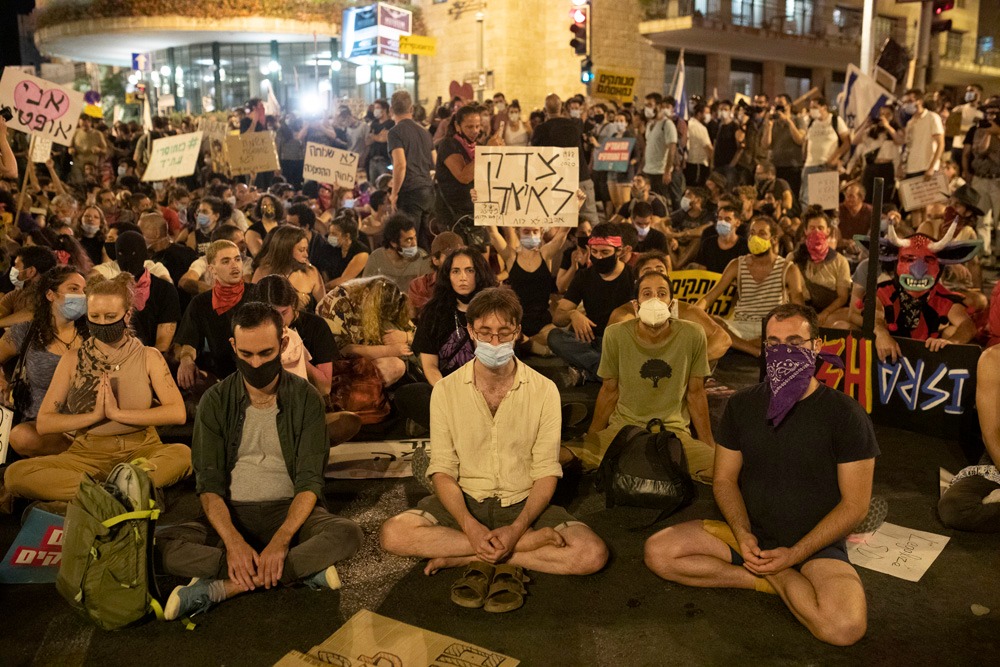
Givati was arrested at last Thursday’s protest. Police claimed he was interfering with officers in the line of duty, and at the police station he was asked to sign a restraining order barring him from Jerusalem. He refused, and at a court hearing to extend his arrest, Givati’s own film of his arrest led the judge to release him without conditions.
During his arrest, Givati says, he and fellow activists helped other protestors who were being arrested for the first time, telling them what to expect until their release. Givati rejoined the protests on Saturday.
‘It’s leading people to think freely’
Other leftists say that the tolerance toward anti-occupation protesters is because they have been showing up since the first demonstration, and so subsequent newcomers have become accustomed to anti-occupation slogans being an established part of the proceedings.
Government incitement against the protesters has also played a role, some say. “The right has called the protest ‘left-wing’ and ‘anarchist,’” says Adi Winter, a protester who was arrested last Thursday and ordered to stay away from the Prime Minister’s Residence for 10 days. “That has actually allowed us to be leftists,” she adds.
“If they call us anarchists, then let’s be anarchists,” says Vardi. “People on the ground, who know how complicated the protests are, aren’t going along with these labels. They’re not snatching our signs, and a number of people come up to ask us questions. Some do say that [our message] is not connected, but not aggressively — they’re starting a conversation.”
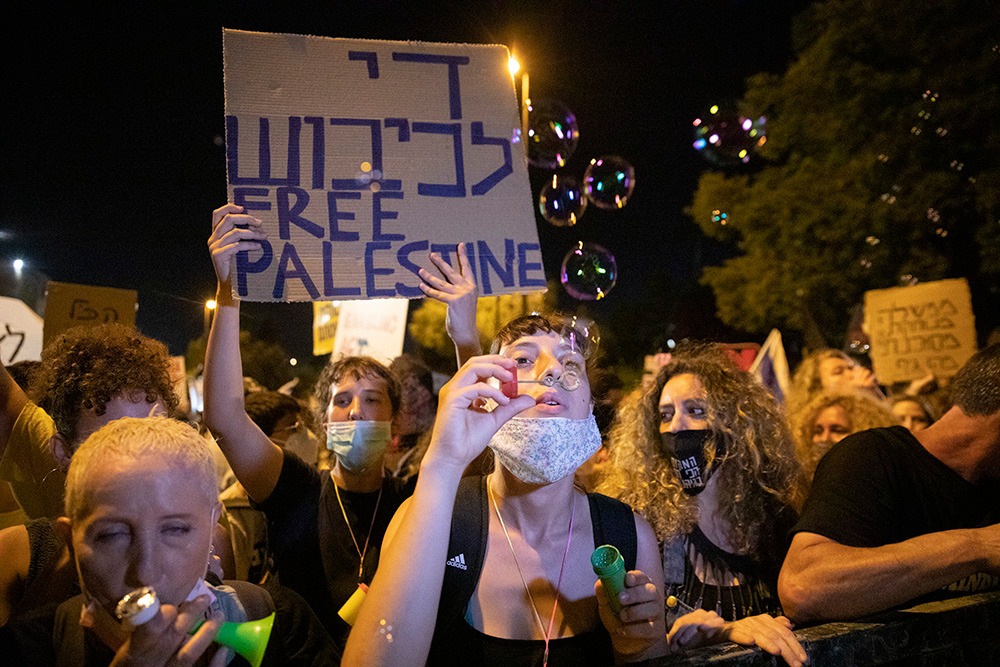
“Trying to shamelessly slander [protesters] might actually have the opposite effect,” says Ariel Bernstein, an activist who was arrested at a demonstration last week. “It’s leading people to think freely and not censor others. These protests are allowing people to express their opposition to the government’s behavior, and they can see there are others ready to fight alongside them.
“It’s infuriating for the police and for the Public Security Minister [Amir Ohana, who has been trying to find different ways of shutting down the protests], because all of a sudden there’s a group of people who don’t really care about being called leftists,” Bernstein adds.
‘We’re starting to change, too’
Anti-occupation protesters have also been trying to connect their message to the demonstration’s central theme.
“Our goal is, as far as possible, to reach a broad common denominator,” a young activist told +972 last Thursday. “If we had a sign reading ‘Free Palestine,’ it would have been seen as a provocation.”
The fact that most anti-occupation protesters also identify with the “Bibi out” message is helping bridge the divide between the different protesters. They are also united in their messaging around corruption, anti-democratic trends, and the state of the economy. Anti-occupation protesters also note a shift in their own approach.
“We want to make these connections, because people are waking up,” says Vardi. “It’s not just ‘anyone but Bibi,’ it’s also about the government and the occupation.”
“We’re not here to exploit the demonstration — we’re starting to change, too,” says Winter. “We shouldn’t be thinking that we’re better [than others]. We need to understand that in order to radicalize [others], we need to be part [of the protests].”
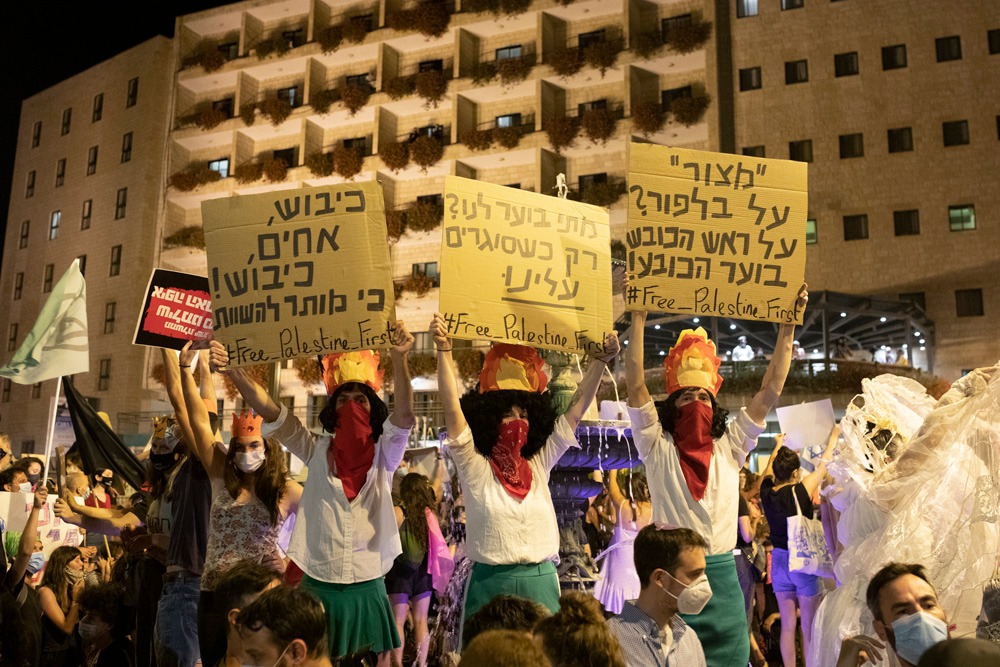
Some protesters have contrasted the current demonstrations with the 2011 social protests, during which most participants were outraged at efforts to draw attention to the Nakba. This is, Winter says, part of a broader understanding that more groups need to join the fold — “haredim, Ethiopians, Palestinians.” At the demonstrations last Thursday, many protesters encouraged ultra-Orthodox Jews to join in — which didn’t happen in 2011, according to Winter.
“We’re obviously also protesting against corruption,” says Givati. “Corruption is one of the causes of the occupation. We want to talk about the occupation because many people don’t understand how deep the corruption goes.” He, too, is noticing a change in his outlook: he is becoming more tolerant about protesting alongside people with whom he would, in ordinary circumstances, strongly disagree with.
‘Easy to draw the connection to the occupation’
Many anti-occupation protesters believe that the murder of Iyad al-Hallaq helped open people up to their message.
“People told me this protest was the most important of all,” says Itai, an activist carrying a placard about al-Hallaq at a demonstration last week. “[The shooting] was shocking, an autistic person who was murdered. The only time someone remarked on my sign was not over its contents, but over the fact that I was standing opposite the police with it — they said we hadn’t come to protest the police.”
Some trace the birth of the “anti-occupation bloc” to the protest that took place after al-Hallaq’s murder, when hundreds of people demonstrated in Jerusalem and blocked the light rail. Those protests, people say, brought the left back out onto the streets.
Ariel Bernstein, who was arrested at last Tuesday’s protest while also holding a sign mentioning al-Hallaq, says he is “surprised” at the amount of support the message has received. “We tried protesting before the current demonstrations, but people didn’t really join.”
Now, however, he sees young and old people alike — not necessarily that politically active — going out to protest, even in the face of death threats and verbal and physical abuse from right-wingers.

“We’re there for them,” Bernstein adds. “They know they have support. And when La Familia [the far-right ‘ultras’ of the Beitar Jerusalem soccer club] come to protect Netanyahu, we’re clearly talking about a war against fascism.”
Beyond the murder of al-Hallaq, some protesters also believe that the annexation affair — which brought thousands of people out to demonstrate in the run-up to July 1 — has also helped bring different groups together.
“People are saying that Bibi is focusing on annexation instead of worrying about us,” says Givati. “They can see that the government is dealing with that instead of the economy, and from there it’s easy to draw the connection to the occupation.”
A group of three protesters drew a fair amount of attention for dressing up in the colors of the Palestinian flag and carrying signs that read, “A corrupt leader for a corrupt people.” Aside from two people who brought Palestinian flags, this group had the greatest potential to cause friction.
“There’s pushback,” says one of the protesters, Uri. “but also a willingness on the part of the protesters to receive some internal criticism. With the loss of trust in the government, people are feeling less need to maintain their faith in the state and what it represents… you can’t separate the government from the occupation and the state of constant war.”
‘Palestinians will not come without their identity’
Most of the protests so far have not included speeches, yet dancing, songs, and impromptu performances have been an integral part of the events. At a demonstration on July 14, before protesters began marching downtown and confronting police, hip hop group Pe L’Ozen performed with messages against occupation, racism, and police violence. Even when the word “occupation” was uttered in one of the songs, the audience did not stop dancing.
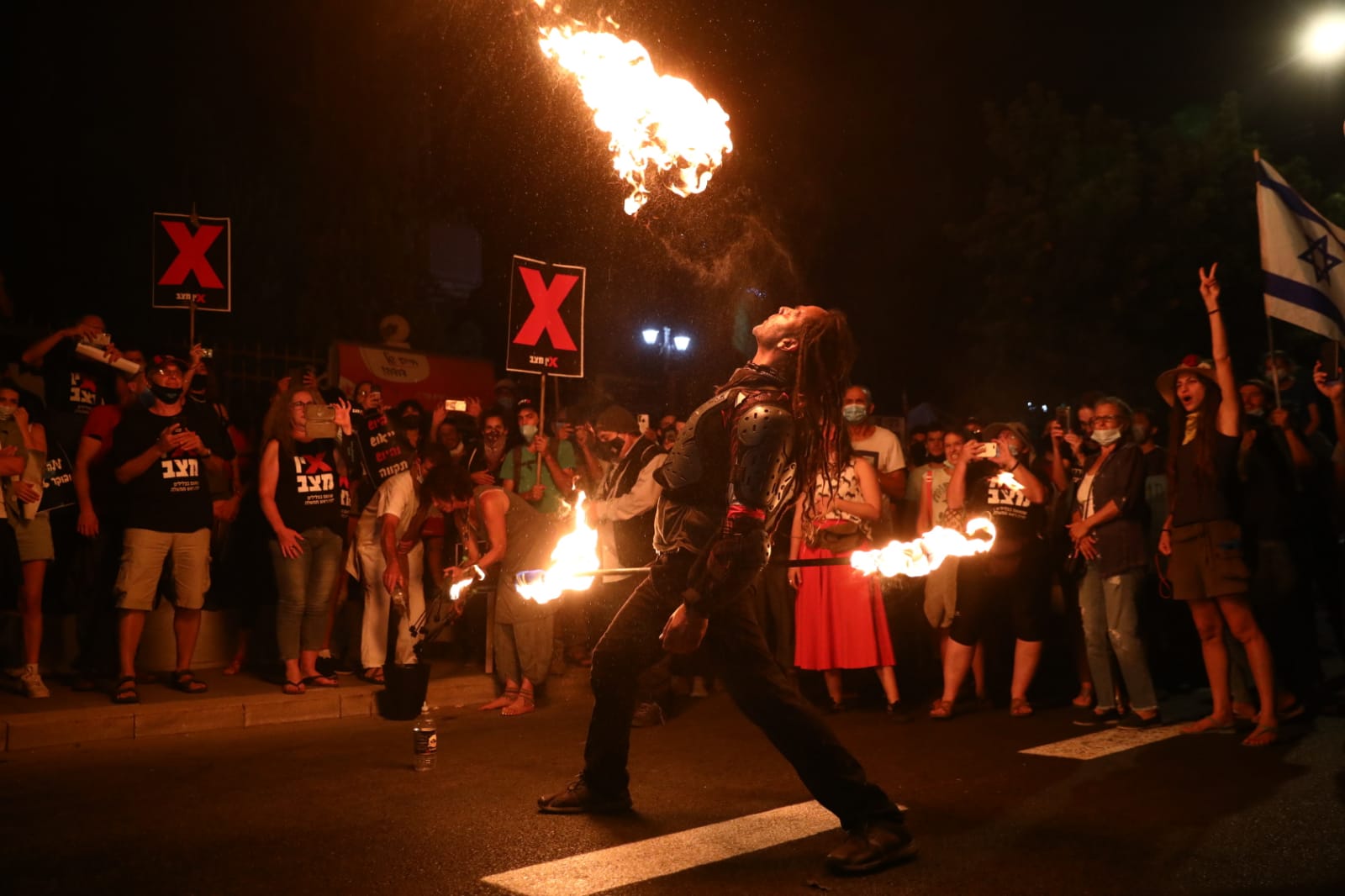
This was even more pronounced during the protest last Thursday. The organizers set up a stage outside Netanyahu’s home, where Neta Wiener and Samira Saraya, two members of the Israeli-Palestinian hip hop troupe System Ali, performed in front of thousands. “The pain is the same, the voice of Iyad al-Hallaq is the voice of George Floyd,” sang Saria, “I haven’t been able to breathe for 72 years, tell me how much more is possible?” The crowd cheered and applauded.
“The truth is that I was surprised, I expected them to boo us,” Saraya said after the show. “There were some people who said [our performance] was unrelated and the protest was apolitical. If we did not have a clear statement to make, we would not have gone onstage. We would not come here to make people happy, but rather to convey political messages that connect police violence that has existed here since the founding of the state to what is happening now.”
Saraya notes that there is a gap between the treatment of the Balfour protesters and the treatment of Palestinian demonstrations in Israel. “Public Security Minister Ohana is trying to persuade the police commissioner to use more violence,” says Saria. “He wants the police to use the same amount of violence against everyone. He’s right. Ohana has admitted that the police treat Arabs and Blacks differently [than the anti-Netanyahu protests].”
Saraya is also well aware that Palestinian citizens of Israel have mostly refrained from attending the demonstrations. Despite the fact that the political messages have been received positively, she wonders whether a Palestinian flag at the protests would be similarly welcomed. “Palestinians will not come without their identity,” she said. “The problem is not the flag, but how you react to the flag that I am flying.”
This article was first published in Hebrew on Local Call. Read it here.


